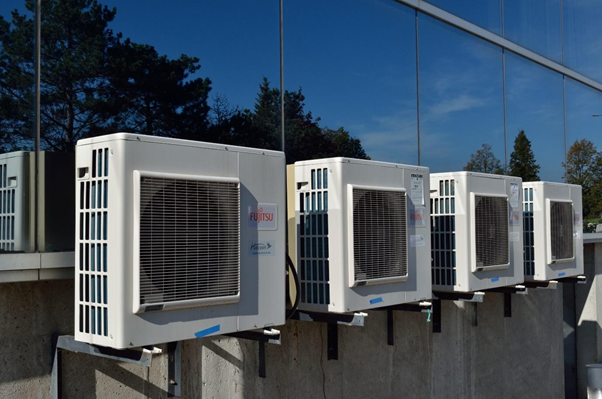Since most business owners don’t want to get directly involved with their heating and cooling systems, they often aren’t aware of the energy consumption and waste of money that occurs as a result of inefficient industrial HVAC solutions.
Even if the HVAC system you have installed in your commercial space is extremely efficient and new, there’s still a lot you can do to improve it and extend its lifespan. It’s also important to note that not everyone can buy newer HVAC units that are designed to be energy efficient. Luckily for you, there are several steps you can take to improve the efficiency of your existing industrial HVAC unit.
Whether you hope to reduce environmental concerns or save money, we’ve narrowed down six tips that may help you conserve energy and reduce overall costs.
1. Keep up with Routine Maintenance
The simplest way you can keep your industrial HVAC system working smoothly and efficiently is by scheduling maintenance regularly and making sure your system and all the components are always in tip-top shape.
Even if you don’t want the added cost of hiring a technician to inspect and carry out HVAC repairs training solutions, it can definitely help you feel a lot more at ease as they can identify and address potential issues before they can become major problems that require expensive solutions.
2.Install Energy-Efficient Windows
For smaller businesses, it’s advisable to get storm windows installed that will help you save around 15% of annual building costs. For larger businesses that operate in multi-story buildings with many windows, a similar concept can work as long as you’re consulting with experts. With the right help, large businesses may even reduce their overall energy consumption by 50%.
Once you install window film and make sure that you’re cleaning and replacing any faulty components as soon as they come to your attention, you’ll be able to ensure that all the windows in your commercial building will stay at peak performance just like they’re supposed to. You’ll also be able to notice an immediate difference in your next energy bill.
It’s important to keep up with proper maintenance and repair if you don’t want your savings to decline over time.
3.Reduce Load Capacity
Another great tip is to look for ways you can reduce the load capacity of your building. There can be several factors that could be causing your HVAC system to work harder than it needs to.
Examine the lighting systems you have in place that could be generating a lot of heat. Consider installing energy-efficient lights such as LEDs or improved fluorescents to make sure the strain on your HVAC system is reduced significantly.
The same applies to other equipment like office machines and manufacturing equipment that are known to generate so much heat that they may end up costing you double; once to power such systems and again to power your HVAC system so it can compensate for the heat being generated by these machines.
Looking for a boiler operator training that will teach you how to operate your steam, air, and water systems at maximum efficiency? Visit our website to take advantage of our educational seminars and online training courses.
4.Insulate the Building
It’s no secret that building energy management typically overlooks essential components like insulation and air sealing when it comes to implementing practices that revolve around energy conservation. There’s no doubt that a poorly insulated building will lose a lot of conditioned air.
You need to make sure your building is properly insulated so it can trap in all the air (both cooled and heated air) and improve the efficiency of your HVAC system. There are a lot of ways you can insulate and seal your building. Consider inspecting the roofs, pipes, walls, and ducts for any cracks and holes and getting them repaired. These are common suspects that are typically responsible for energy loss and are known to wear down over time.
You may also try wrapping them in insulation to conserve energy. If you want to keep your building warm during cold months and cold during warmer months, you need to opt for proper insulation and building envelope sealing.
5. Tweak Your Thermostat
Most people aren’t receptive to minor temperature changes that lie within 2 to 3 degrees Fahrenheit. You’ll be surprised to find that if you set your thermostat closer to the temperature outside, you’ll be able to save energy and improve your HVAC system’s efficiency as well.
On hot days, if you set your HVAC system at 75 degrees it will utilize about 18% more energy than if you set it at 78 degrees. You may turn the temperature up, even more, when there are fewer people in the building.
6.Consider Upgrading Your System
You may not want to hear this but when your HVAC system is outdated, it simply won’t perform as efficiently as newer models. If you’re looking to save energy and overall costs, you should consider upgrading your HVAC system as that will help you avoid spending so much in energy than you should.
A newer and more efficient model will perform a lot better and you’ll be able to notice the difference in your energy bills. If upgrading your system seems like too much of an investment, you could also try retrofitting which involves getting portions of your HVAC system replaced with newer and more advanced parts.
Even though it’s not nearly the same as upgrading to a new system, it may help improve your system’s efficiency by a long shot. The money you save in energy could help compensate for the cost you paid for the improvement down the line.
Final Word
Just like most systems, you need to stay on top of scheduled maintenance to make sure your HVAC system operates smoothly at all times. Boilers, chillers, and other cooling and heating equipment may break down over time which is why it’s recommended that you get your system checked before the beginning of every season and make sure any leaks or defects are repaired in time.
Get in touch with us at Campbell-Sevey so we can help you ensure that all your energy systems work at peak efficiency!




